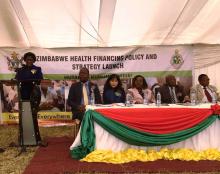Zimbabwe launches Health Financing Policy and Strategy
6 June 2018. Today Zimbabwe became the 17th country in the WHO AFRO Region which have completed their Health Financing Strategies; when they launched the Zimbabwe Health Financing Policy and Strategy. The launch, which was held at Murewa District Hospital in Mashonaland East Province, brought together different players in the health sector including senior Government officials, parliamentarians, civil society organizations, health development partners and donors as well as members of the local communities in Murewa District. The launch in a hospital setting provided participants with the opportunity to reflect on the financial challenges facing the health sector – from the obvious weak funding base for service delivery, to staff shortages in key departments.
The Health Financing Policy and strategy launched today was strongly informed by WHO guidelines on health financing. WHO’s approach to health financing is embedded in the health systems framework, recognising health financing as one of the Health Systems Strengthening building blocks. The policy and strategy acknowledge that the way funds are raised, the way funds are allocated and the way services are paid for influences how services are accessed by the population.
The Health Financing Strategy is also commended for its focus on better use of available resources, and increased Government allocation to health leading to reduced direct out of pocket payments by households which will in turn reduce financial barriers to access for the poor. It also brings in innovation in exploring more options to raise funding for health, and the creation of a pool of funds to ensure better management of health funds. Emphasis on achieving sustainable health financing is explicit in the Health Financing Strategy so that gains can be sustained. The strategy is also strongly linked to the current National Health Strategy (2016-2020) which serves to ensure the National Health Strategy is well financed and implemented. All these are positive steps towards financial risk protection for the population and ultimately Universal Health Coverage.
Speaking at the launch, WHO Zimbabwe Representative ai, Dr Juliet Nabyonga said in as much as the Health Financing policy and Strategy are excellent documents their full purpose will be measured in the boldness of implementing them. She said that she hoped that they will not suffer the same fate as other sound policy documents that have been developed in other countries but then just got shelved. “A number of African countries have faced challenges with implementing their Health Financing Strategies and among these is the lack of sustained government commitment, adequate human resources and technical capacity, and Zimbabwe needs to pay attention to these, “said Dr Nabyonga. She also reminded the people gathered that health financing reforms cannot be implemented in isolation, and that there is need for concomitant attention to complementary actions in other areas of health systems including governance, information systems and service delivery mechanisms.
Dr Nabyonga reiterated WHO’s commitment to support the Ministry of Health and Child Care to implement the Health financial policy and strategy.





